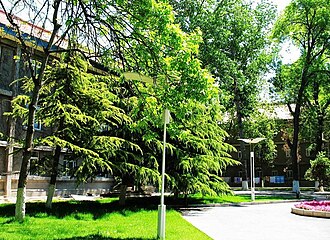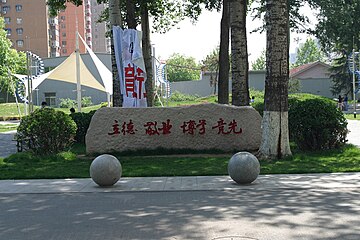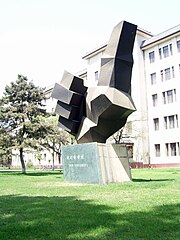Communication University of China
| File:Communication University of China logo.png CUC Logo | |
Former names | Beijing Broadcasting Institute (1959 - 2004) |
|---|---|
| Motto | 立德、敬业、博学、竞先 (Chinese) |
Motto in English | Integrity, Professionalism, Erudition and Competence |
| Type | National |
| Established | 1954 |
Academic staff | 1096 |
| Students | 15,307 |
| Undergraduates | 9264 |
| Postgraduates | 3512 |
| Location | , |
| Campus | Urban 116.88 acres (473,000 m²) |
| Website | Template:Zh icon cuc.edu.cn |
The Communication University of China (CUC) (Simplified Chinese: 中国传媒大学 pinyin: zhōngguó chuánméi dàxué) is a public university in Beijing, China. Formerly known as the Beijing Broadcasting Institute (BBI) (Simplified Chinese: 北京广播学院, pinyin: běijīng guǎngbō xuéyuàn) it is one of the Project 211 key universities directly administered by the Ministry of Education of the People's Republic of China. The predecessor of the school was a training center for technicians of the Central Broadcasting Bureau that was founded in 1954. In April 1959, the school was upgraded to the Beijing Broadcasting Institute approved by the State Council. In August 2004, the BBI was renamed into the Communication University of China.
Communication University of China is one of the top public universities in China. It is ranked No.1 of media education and ranked No.1 among language universities in China. According to 2012 China Discipline Ranking approved by the Chinese Ministry of Education, Communication University of China is ranked 1st in "Journalism and Communication" and "Drama Film and Television", 6th in Art Theory, 9th in Design, 17th in Fine Arts, 23rd in Politics and 32nd in Chinese Language and Literature in China.[1][2]
History

CUC's history dates back to March 3, 1954 when the first training class for broadcasting professionals was held by the then Central Radio Administration. This then led to the founding of Beijing Broadcasting College in 1958. On September 7, 1959, CUC's precursor Beijing Broadcasting Institute (BBI) was established. During the ensuing four decades, BBI remained a relatively small college and only known among the circles of Chinese media professionals.
On August 19, 2004, the State Council of the People's Republic of China approved the renaming of the institute to the Communication University of China. It has now developed into a comprehensive institute of higher learning with broadcasting, film production, journalism, drama, animation, advertising, newscasting, creative cultural industry, Communications engineering, foreign languages (especially minority language), management and media law education as its major academic disciplines.[3]
Campus
CUC's 116.88 hectare main campus is located in Dingfuzhuang, eastern part of Chaoyang District, Beijing. It is just outside the Eastern 5th Ring Road, and is just along the Beijing-Tong County expressway. With increasing number of students and fast development, the university has expanded its campus to nearby areas to provide more space for student and staff accommodation and research institutions. The main campus is composed of teaching and administrative buildings, theatres for cultural activities, large compounds of student dormitories and staff apartments, media production studios and scientific research centers. The campus is linked by the Communication University of China Station of Beijing subway Batong Line.
Student societies
CUC has over 50 Student Societies, the mains are: Amigos Latin Dance Society Association of Green Hope Association of Luxun Studies Budai Drama Society Drama Society Experimental Drama Society Guitar Club Minority Languages Society TYP Animation Society
Gallery
-
Main Building
-
Cultural Square
-
Old Apartment for Young Staff Members
-
Snowy Campus
-
Snowy Campus
-
No. 1 Teaching Building
-
Behind No. 1 Teaching Building
-
Playground
-
Student Dormitory
-
motto
-
Sculptures
Foreign languages teaching
CUC offers 30 foreign languages since its establishment, which includes English (since 1958), Spanish (since 1959), French, Russian, German, Japanese, Korean, Portuguese (since 1960), Italian (since 1960), Hindi (since 1965), Bengali (since 1964), Nepali (since 1964), Assamese (since 1965), Urdu (since 1962), Tamil (since 1959), Sinhalese (since 1965), Pushtu (since 1964), Persian (since 1988), Zulu (since 1965), Swahili (since 1960), Esperanto (since 1959), Turkish (since 1959), Swedish, Hausa (since 1965), Malay, Hebrew, Greek (since 1964),Hungarian, Dutch (since 1965),Laos (since 1965). It is still the only university in China offers degree courses of Bengali, Tamil, Pushtu and Esperanto. And its affiliation "CUC Nanguang Institution (Known as "CUC Nanking")" offers other languages like Arabic, Czech, Thai and so on. According to "2012 Wushulian's Chinese University Ranking", CUC ranks 1st among the "Language Universities" of China.
Chinese language teaching for foreigners
The Chinese language school for foreigners is inexpensive but gets relatively poor reviews from students due to relatively disorganization and inexperienced faculty, according to a Global Times report.[4][5]
In cooperation with National Office for Teaching Chinese as a Foreign Language or Hanban, CUC also operates several Confucius Institutes with its overseas partner universities, providing Chinese language and cultural education for learners outside of China.
Cooperation
Up to now, the CUC has established cooperative relations with more than 200 colleges, science research institutes and media organizations in over 50 nations. Besides, several research institutions like research centers for Asian media, European media and Asian animation, etc. have been established.[6]
The CUC is a member of CILECT.[7]
Affiliations
In September, 2004, in cooperation with Nanjing Meiya Educational Investment Co. Ltd., CUC co-founded a private college in the southern city of Nanjing, Jiangsu Province. The Communication University of China' Nanjing (CUCN) is directly supervised by the board of directors, with CUC's former president as the honorary head of the board.
CUC also has some affiliated institutions that provide commercial training and educational service for the public. The CUC press is the only publishing house in China that exclusively publishes media and journalism related books and audio-visual products.
Notable alumni
CUC is known for training newscasters and television and radio announcers, administrators and technicians. Some of its notable alumni include:
- Xu Ming,Vice Director at the Legal Department of China National Radio
- Ding Wenhua,Member of Chinese Academy of Engineering
- Hu Zhanfan, Minister of CCTV
- Luo Jing, news presenter from China's CCTV
- Cui Yongyuan, television host from China's CCTV
- Bi Fujian, television host from China's CCTV
- Chen Luyu, a Phoenix Television talk show host.
- Li Yong, television host from China's CCTV
- Bai Yansong, news presenter from China's CCTV
- Chai Jing, former journalist from China's CCTV
- Chen Luyu, host from Hong Kong's Phoenix Television
- Zhang Haijie, news presenter from Singapore's MediaCorp Channel 8
- Chen Xiaonan, a Phoenix Television talk show host.
- Li Xiang, actress, television host and singer.
- Alex Man, Hong Kong actor
- Dong Zhen, singer-songwriter
- Kassapa Senarath, CCTV and CRI Sri Lanka Representative [8]
- Zhao Quan Yin, news presenter from Singapore's MediaCorp Channel 8
References
- ^ 2012 China Discipline Ranking 0503 Journalism and Communication
- ^ 2012 China Discipline Ranking 1303 Drama Film and Television
- ^ "History & Tomorrow". Retrieved 8 November 2011.
- ^ "How do Beijing's best universities compare for students?". Global Times. June 2, 2011. Retrieved 8 November 2011.
- ^ "Breaking down the best universities for studying Chinese". Global Times. June 2, 2011. Retrieved 8 November 2011.
- ^ "Cooperation & Exchanges". Retrieved 8 October 2012.
- ^ "member of CILECT in China". Retrieved 8 October 2012.
- ^ "CUC welcomes Mr. Kassapa Senarath".











